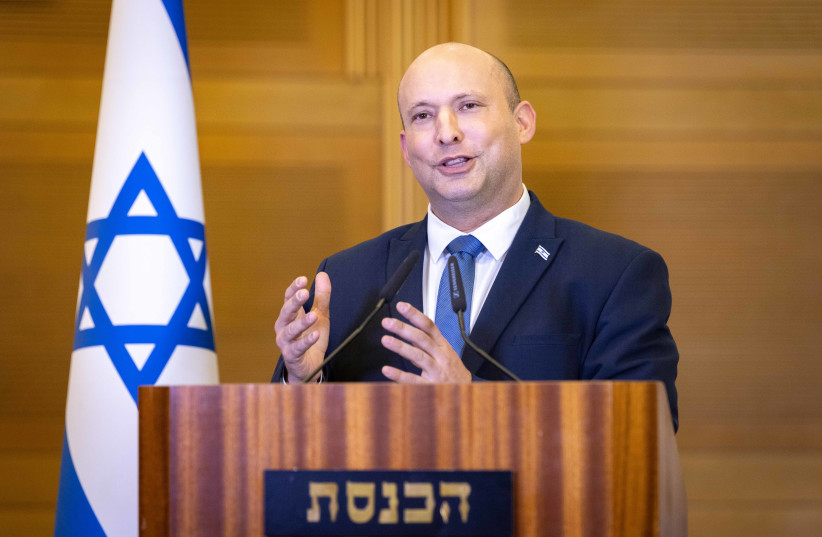Former prime minister Naftali Bennett said on a speaking tour in Sydney, Australia, that he thinks the only way for Israel to end the current “messy” political situation is to form a unity government. He also said that he is in favor of reforms in Israel’s judicial system, but that the current government has gone “too far” in the way they’ve been promoting the reforms and to the extent they are planning to amend the laws.
“The only way [to move] forward is a unity government, we cannot have a one-sided government in the next few years; We just can't, we have to have everyone in the tent,” Bennett said at an event for Keren Hayesod-UIA in Australia - according to a recording obtained by The Jerusalem Post. Bennett will be speaking at different Jewish communities across Australia this week.
“You all know there's a mega-crisis going on in Israel. It's probably the biggest domestic crisis,” Israel has ever had, he said.
“We have to have everyone in the tent,” Bennett said, adding that “we need a broad government using the 70%,” he said of the 70% of issues that a broad government can agree upon. “I just don't see any other mechanism to get Israel out of the conundrum.”
The history of Israel and internal divisions
The former prime minister explained to the audience that “it's the third time in our history that we have a Jewish sovereign state in the land of Israel. The first time was King David and King Solomon which went on for eight decades. Right after that there was a fight. This is in the Bible, you just open up.”

“They divided into two kingdoms, and then we lost 10 tribes. So all of us are descendants only of the Judea apart [of Israel] and that we're all called Jews.
“So we've messed it up, our ancestors blew it. They couldn't keep it together for more than 80 years. Then you fast forward to the second time we had a sovereign country state. The second temple went on for hundreds of years, but there was only a short period of 75 years during the time of the Maccabees that we were a united and sovereign state, [with] full Jewish sovereignty; without the Persians, Greeks or the Romans. It was a Jewish thing. [There were] Jewish taxes, Jewish government, Jewish rules, Jewish schools, just like today.”
Bennett said that it all went downhill afterward. “They fought about nothing,” he said of the era before the destruction of the second temple. “The Romans didn't come in [to Judea] on their initiation, Jews invited them in, and then we lost sovereignty.”
Bennett looped back to our current conundrum, “guess what?” he asked, “the current state of Israel is now 75 years old. The Jewish people never pass the eighth decade. And this is us.” “We have to go on forever,” he continued, “We're not going to get a fourth chance. And that's why I have to say, I am afraid. I'm worried. And it's fully self inflicted, because everything's ragged in this role. The economy's never been as good, security has never been as good. This is 100% Made in Israel. And we just have to work together.”
Bennett explained that the two political camps in Israel used to be regarding the territories and now there are “two tribes emerging,” and that “there are people who are working hard to create these two tribes.” He went on explaining the new divides in Israel, based on the Ashkenazi-Sephardi divide. “It's an irony because they're [the right-wing]using terminologies such as oppression… Now, Israel's history doesn't have oppression [in it]. I fully don't accept that [claim]. But there were errors made during the Zionist project.”
He concluded that “we're not giving up and there's so many great people in Israel, we just need to calm things down and work together towards this next phase.”
What about judicial reform?
Regarding judicial reform, Bennett said that “Israel's judicial system has two problems: First of all, it's not diverse enough. The Supreme Court of Israel, has been for decades, a closed club and they would typically appoint folks who are very similar in their opinions, and it doesn't fairly represent the mainstream, or the diversity [of Israel]. That's a true criticism, and it needs to be fixed.”
He shared with the audience that in his opinion, the justice system has “drastically improved,” in the past five years, “but it needs fixing, and this criticism is a fair criticism.”
The second problem according to Bennett with the Supreme Court is that it has become “too active.” He thinks that “a Supreme Court needs to protect the basic rights. So if the government decides to discriminate against the Ethiopians or clearly or if someone wants to take my backyard away from me, that's where you want the Supreme Court to intervene.” Bennett explained that the Supreme Court shouldn't become a “second opinion of governmental decisions, whether they're smart or not. If there's no human rights violation, it's just a stupid government decision. They should not intervene. That's not their business.”
But Bennett shared that he feels this government, many of which used to be his closest friends and allies, are “taking it too far,” and so, in his mind, “we need a compromise.”
“People are really terrified on both sides. Terrified. So if we understand that it's 90% Psychology and 10% substance, we can solve it. The problem is that some folks are using it to heat up their base for political reasons and we need to fight that. But I think something good will come out of all of this thing we're in. I became a radical moderate. I'm a huge believer in moderation. That's what we need to do.”
